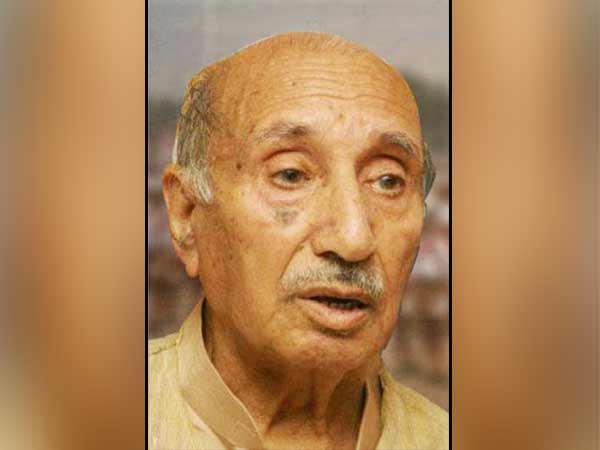Prof Balraj Madhok dies at 96, RSS condoles
New Delhi, May 2: Staunch hardcore nationalist, former president of Bharatiya Jansangh the earlier avatar of the present Bharatiya Janata Party (BJP), Prof Balraj Madhok breathed his last Monday at the age of 96.
Madhok was ill for the last few days and the end came around 9.00 am at his residence in Central Delhi’s New Rajendra Nagar.
Born on February 25, 1920, in Skardu (Baltistan) region of Kashmir (now in Pakistan’s Gilgit=Baltistan area), Madhok had his education in Srinagar, the Prince of Wales College in Jammu and the Dayanand Anglo-Vedic College (DAV College) in Lahore, graduating with B. A. Honours in History in 1940.
He came in contact with Rashtriya Swayamsevak Sangh (RSS) while he was studying at Lahore in 1938 and became a Pracharak in 1942. He was sent to Jammu and Kashmir to start Sangh work there.
Madhok played a crucial role in saving Kashmir by frustrating the Pakistani plans to grab the region during the independence days. He was also one of the founders of Akhil Bharatiya Vidyarthi Parishad (ABVP) and later Bharatiya Jansangh.
Prime Minister Narendra Modi on Monday condoled the death of Balraj Madhok, saying he was “selflessly devoted to the nation and societyâ€.
Describing him as one whose “ideological commitment was strong and clarity of thought immenseâ€, Modi said he had the good fortune of interacting with him on many occasions. “His demise is saddening,†the Prime Minister said.
Bharatiya Janata Party (BJP) President Amit Shah said that he was saddened by Balraj Madhok’s demise. His entire life was committed to nation and ideology, he said.
RSS Sarsanghchalak Dr Mohanrao Bhagwat and Sarkaryawah Suresh alias Bhayyaji Joshi expressed their condolences stating that Prof Madhok was dedicated to the motherland and committed to his objective and mission. Both the leaders offered condolences on behalf of all the swayamsevaks.
Union Minister of Science and Technology and Earth Sciences, Harsh Vardhan tweeted, “Balraj Madhok left for heavenly abode today-India loses a great intellectual, thinker and a social reformer.â€
Prof Balraj Madhok was very active in the contemporary Indian politics in the 1960s. He succeeded Pt. Deendayal Upadhyaya as President of Bharatiya Jansangh following the murder of Upadhyaya. In 1967, under his leadership the Jansangh secured 35 seats in the Parliament, its highest tally. He saw the split in the Congress in 1969 as an opportunity to expand the Jansangh. However, owing to differences with other leaders, Madhok was expelled from the Jansangh during the Presidential tenure of L K Advani who headed the party in 1973.
When he was in Kashmir, Madhok formed the Praja Paraishad in Jammu along with Pt Prem Nath Dogra to resist the Pakistani raiders and armed forces that invaded Kashmir in 1947-48. After the merger of J & K with India and Sheikh Abdullah was appointed as its Prime Minister, the party demanded the complete unification of Jammu and Kashmir with India, in opposition to the loose autonomy negotiated between Abdullah and Nehru (later embodied in the Article 370). Madhok was expelled from Jammu and Kashmir by Sheikh Abdullah as a result of his politician stance.
Madhok moved to Delhi in 1948 and started teaching at the Punjab University College, which was established for the education of refugees from West Punjab. Later, he became a lecturer of history at the DAV College in Delhi affiliated to the Delhi University.
In 1951, Madhok joined Shyama Prasad Mookerjee in the formation of the Bharatiya Jan Sangh. The Bengal branch of the Jana Sangh was established by Mookerjee on 23 April 1951 and the Panjab and Delhi branch were established by Madhok a month later, on 27 May 1951. Madhok served as the secretary of the Panjab branch and later, a member of the Working Committee of the national organisation.
Madhok was arrested during Emergency and was imprisoned for 18 months, (1975–1977). He joined the Janata Party, into which Jana Sangh merged, but resigned in 1979 and tried to revive Jana Sangh under the name Akhil Bharatiya Jana Sangh. However, the party was not successful.
In an interview with the Hindustan Times in 2010 on the occasion of his 90th birthday, he claimed that his then opponent Indira Gandhi had offered him the post of a central Minister in 1980 on her return to power.
Welcome to Haindava Keralam! Register for Free or Login as a privileged HK member to enjoy auto-approval of your comments and to receive periodic updates.
Latest Articles from Bharath Focus
- Narendra Modi: The Architect of India’s Momentous Transformation
- Republic Day Tableaux & Regional Pride
- Tarun Vijay meets Governor Arif Khan on Adi Sankara birthplace
- SC-ST പോസ്റ്റ് മെട്രിക് സ്കോളർഷിപ്പിൽ 5 ഇരട്ടി വർദ്ധനവ്
- Treading the Middle-Path on Temple Management
- Taming the dragon-Part-3
- Taming the dragon- Part 2
- India- China trade wars on the cards? Well researched blog on Indian govt.’s proposed plan to tax 371 Chinese goods
- Before removing the idols, I should be removed; Two Kerala faces we should never forget
- The Unseen Unheard Victims of Article 35(A)


